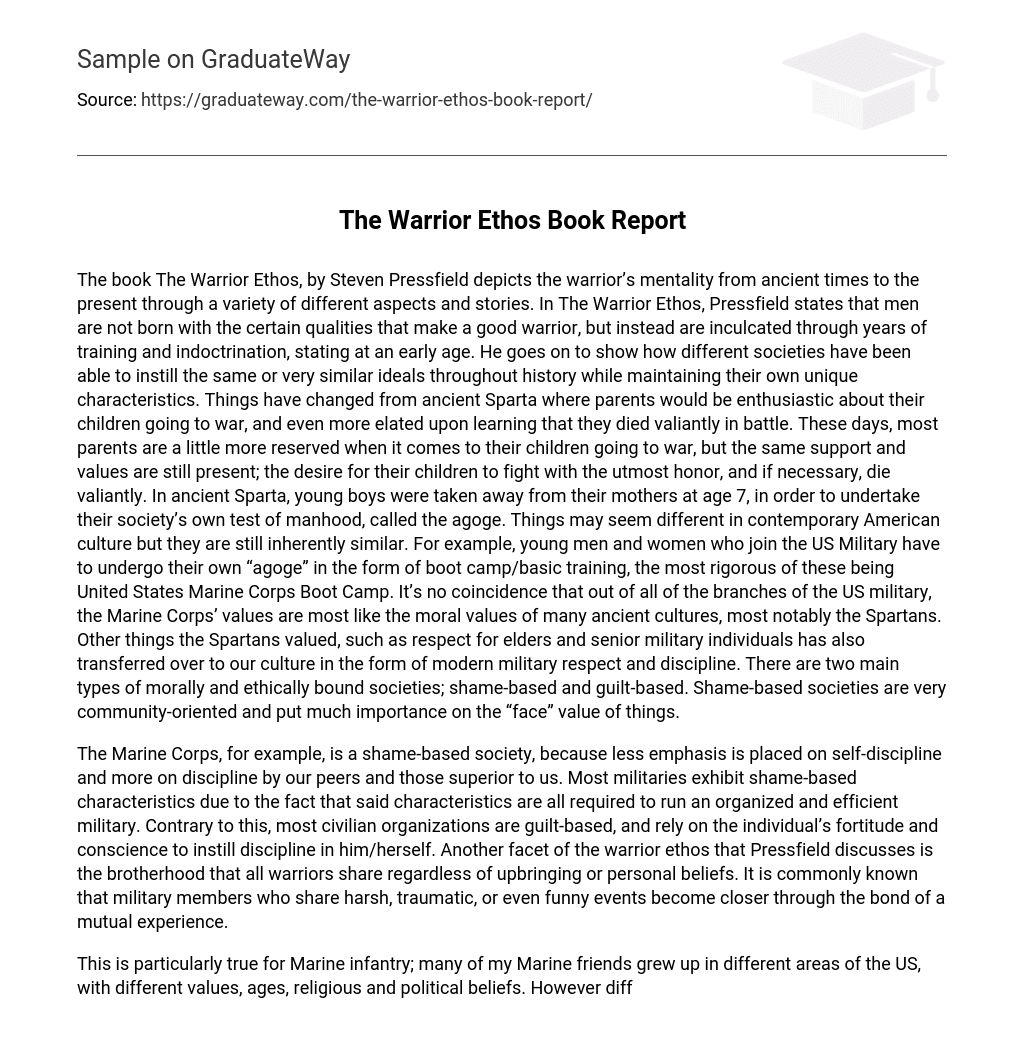The book The Warrior Ethos, by Steven Pressfield depicts the warrior’s mentality from ancient times to the present through a variety of different aspects and stories. In The Warrior Ethos, Pressfield states that men are not born with the certain qualities that make a good warrior, but instead are inculcated through years of training and indoctrination, stating at an early age. He goes on to show how different societies have been able to instill the same or very similar ideals throughout history while maintaining their own unique characteristics. Things have changed from ancient Sparta where parents would be enthusiastic about their children going to war, and even more elated upon learning that they died valiantly in battle. These days, most parents are a little more reserved when it comes to their children going to war, but the same support and values are still present; the desire for their children to fight with the utmost honor, and if necessary, die valiantly. In ancient Sparta, young boys were taken away from their mothers at age 7, in order to undertake their society’s own test of manhood, called the agoge. Things may seem different in contemporary American culture but they are still inherently similar. For example, young men and women who join the US Military have to undergo their own “agoge” in the form of boot camp/basic training, the most rigorous of these being United States Marine Corps Boot Camp. It’s no coincidence that out of all of the branches of the US military, the Marine Corps’ values are most like the moral values of many ancient cultures, most notably the Spartans. Other things the Spartans valued, such as respect for elders and senior military individuals has also transferred over to our culture in the form of modern military respect and discipline. There are two main types of morally and ethically bound societies; shame-based and guilt-based. Shame-based societies are very community-oriented and put much importance on the “face” value of things.
The Marine Corps, for example, is a shame-based society, because less emphasis is placed on self-discipline and more on discipline by our peers and those superior to us. Most militaries exhibit shame-based characteristics due to the fact that said characteristics are all required to run an organized and efficient military. Contrary to this, most civilian organizations are guilt-based, and rely on the individual’s fortitude and conscience to instill discipline in him/herself. Another facet of the warrior ethos that Pressfield discusses is the brotherhood that all warriors share regardless of upbringing or personal beliefs. It is commonly known that military members who share harsh, traumatic, or even funny events become closer through the bond of a mutual experience.
This is particularly true for Marine infantry; many of my Marine friends grew up in different areas of the US, with different values, ages, religious and political beliefs. However different we all might look on the outside, the fact that we’ve all been through good times and bad with each other makes us closer than any civilian could understand. After being a Marine, I find that I’m close to, and always will be, than my civilian friends who I’ve known for years. Along with this, Pressfield talks about how, under all the glory and allure of fighting for one’s country exists the real reason that warriors fight; for our brothers in arms. Political beliefs, government stances, and flags go out the window, only to be replaced by concern for the safety and well-being of the men to our left and right. All of these things are reasons why it is difficult for civilians to understand what it’s like to be a warrior.
This is perhaps embodied best in our motto, Semper Fidelis; Always Faithful, to our brothers and those who depend on us. In closing, Pressfield summarizes that all of these distinct characteristics of warriors are also what make it inherently difficult for many military members to adjust to civilian life. The combination of lack of understanding, lack of discipline, and general apathy of many civilians makes the transition all the more trying. The warrior ethos is what makes up a brotherhood, a brotherhood of warriors who have endured many challenges and pains both physical and mental. The discipline we’ve learned as Marines helps us excel not just in our jobs, but when we go back to the civilian world.





